Tales of deportation in Trump's America
- Published
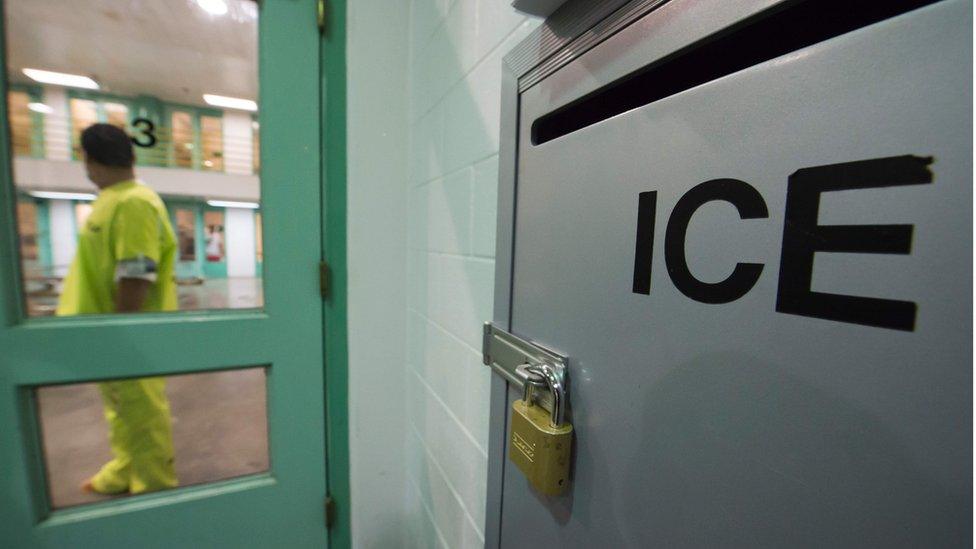
US Immigration and Customs Enforcement (Ice) raids have been executed across the nation
In the weeks since President Donald Trump took office, he has laid out his immigration agenda through a spate of executive orders and memos to Homeland Security, with deportations taking place all over the country.
"We're getting gang members out, we're getting drug lords out," Mr Trump said in late February.
"We're getting really bad dudes out of this country, and at a rate that nobody's ever seen before."
US Immigration and Customs Enforcement (Ice) raids have been executed across the nation. Hundreds of people have been apprehended and deportation proceedings have been initiated for them.

Read more:

According to figures provided by Ice, there were 18,378 removals in January. Mr Trump took office on 20 January. Of those, 9,580 had some type of criminal record, or about 52%.
In February, 17,226 people were deported - again, 52% had past criminal convictions.
But who are the people behind the deportations?

Gustavo "Gus" Zamudio, 18
Arrested: 25 February, Charlotte, North Carolina
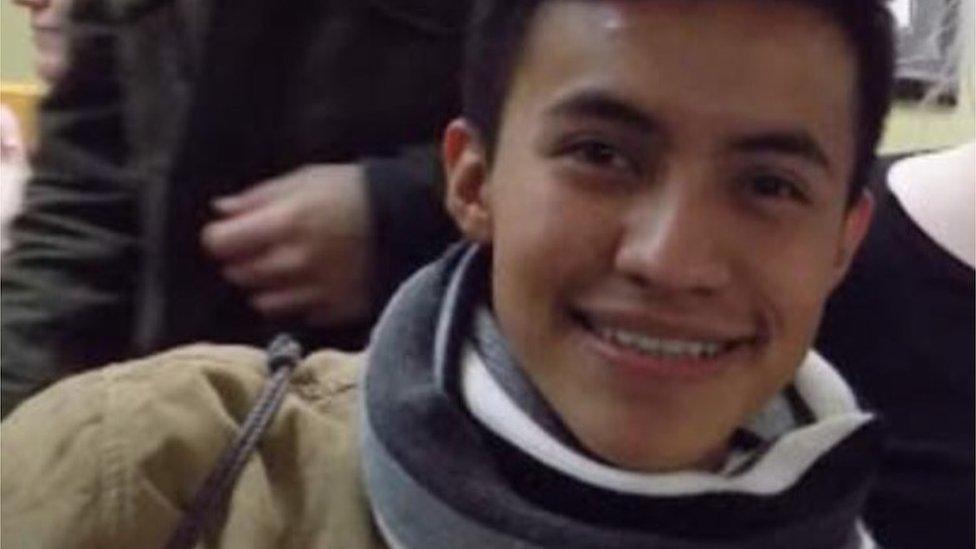
Mr Zamudio was arrested for allegedly stealing nearly $3,000 (£2,427) from the convenience store where he worked as a cashier. The 18-year-old high school senior was transferred into Ice custody after his arrest, and now faces deportation.
Before his arrest, he was protected by an Obama-era policy called Deferred Action for Childhood Arrivals, known as Daca, that allowed people who immigrated to the US illegally as children to apply for renewable two-year deferrals of immigration enforcement. Mr Zamudio's family moved to the US from Mexico when he was only five years old.
Under the Obama administration, Daca recipients convicted of crimes typically served their sentence and then went through immigration hearings to determine whether they would face deportation.
Lawyers for the Trump-led Department of Homeland Security have argued that agents can revoke Daca on the spot, external, at the time of arrest.
"I don't want him to be deported because he doesn't remember Mexico," Mr Zamudio's mother, Maria Aguilar, told a local news station.
"It's not his fault for me bringing him here. He's afraid, afraid of leaving because he doesn't know anyone there."
A judge denied Mr Zamudio bail and he is still in an immigration detention facility in Georgia awaiting further action in his case.

Francisca Lino, 50
Deportation ordered: 7 March, from Chicago
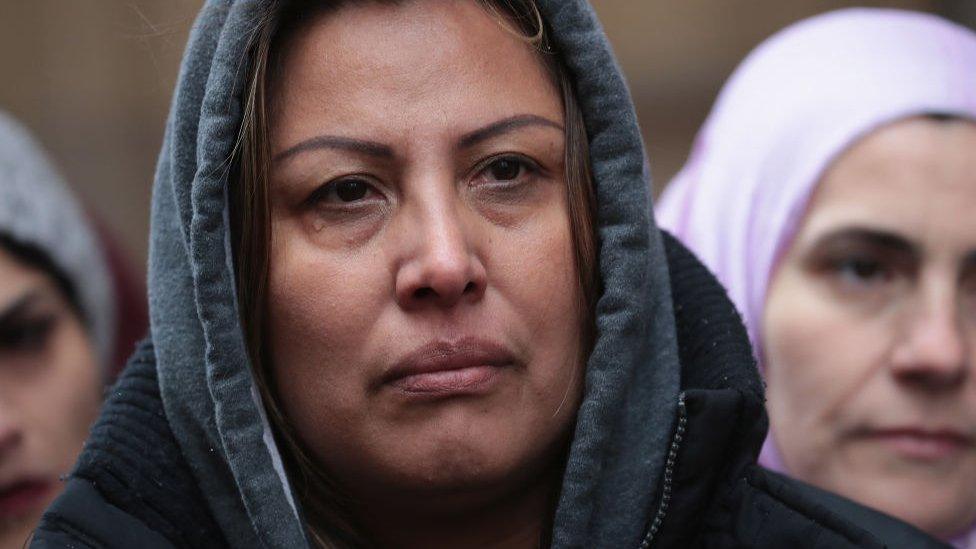
Francisca Lino listens as Rep Luis Gutierrez speaks to the press after the congressman was briefly handcuffed because he refused to leave an immigration office
Ms Lino has lived in the US for the past 18 years as an undocumented immigrant. She married a US citizen and has six children.
At a routine check-in with Ice in Chicago, Ms Lino was told that although she had no criminal history or violations on her record, she would nonetheless be deported to Mexico by this summer.
"It's very hard imagining life without my mother," Ms Lino's daughter, Britzy, told the Washington Post, external. "We've been talking about what we're going to do, what our plans are."
Ms Lino, her family and community members, as well as US Representative Luis Gutierrez gathered in front of the Ice office in the Chicago federal building on Monday to protest against her deportation order. When their requests were ignored, Mr Gutierrez and other immigration activists staged a sit-in at the office and were arrested on Tuesday.
Ms Lino isn't being held in an immigration detention centre, but Ice officials told her that she should return to their offices, prepared for a flight to Mexico, on 12 July.

Jose Escobar, 31
Deported: 2 March, from Houston, Texas
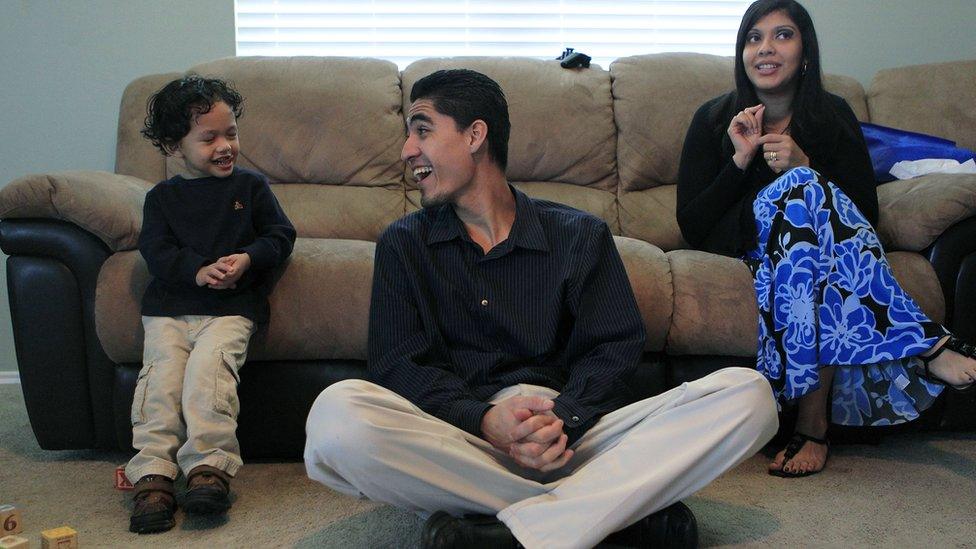
Jose Escobar, his son, and his wife Rose Marie Ascencio-Escobar in 2012
Mr Escobar moved to the US legally from El Salvador with his mother when he was 15, and both qualified for protected status. However, his mother made an error when filing their renewal paperwork when Escobar was still a teenager, causing his protected status to lapse.
He didn't know that he was living in the country illegally until the government put an order for his deportation in motion in 2006. Mr Escobar spent years trying to sort out his status and received a stay of deportation from a judge in 2012.
Mr Escobar is married to a US citizen, has two children and got a work permit so he could take construction jobs.
But under the Trump administration, the deportation process started up again for Mr Escobar, who was detained at his annual check-in with Ice and flown to San Salvador in early March.
His family is devastated.
"I'm begging President Donald Trump to look into my case and see if my husband is really destroying America," his wife told reporters, external.

Khalid Adem, 41
Deported: 13 March, from Ice detention centre in Georgia
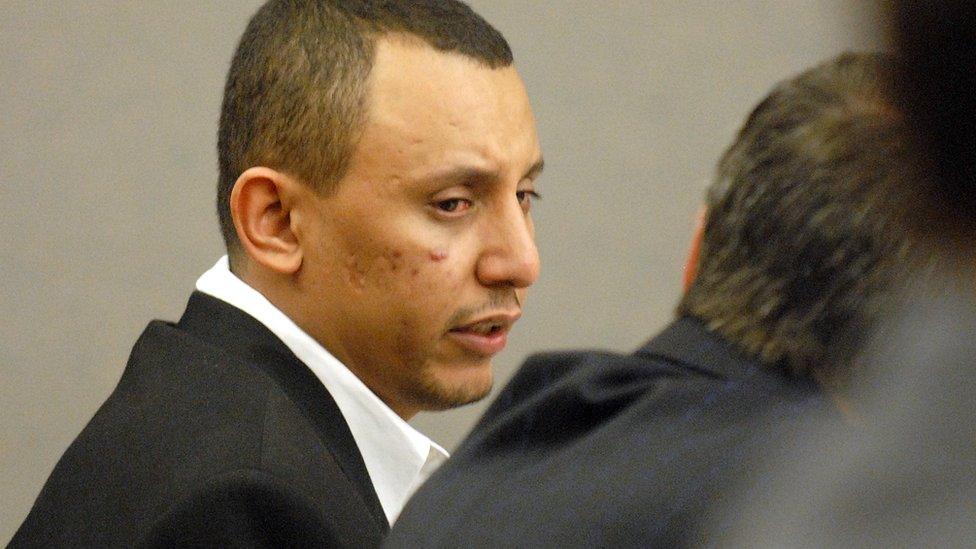
Khalid Adem in 2006
In 2006, Adem, originally from Addis Ababa, was convicted of female genital mutilation, a federal offence.
While living near Atlanta, Georgia, Adem used scissors to remove his two-year-old daughter's clitoris. His wife testified against him at the trial.
A judge sentenced him to 10 years in prison, and which he completed in October 2016, external.
Adem was transferred immediately into Ice custody where he had been awaiting a decision on his immigration status - he was deported this month back to Ethiopia.
The case was the first of its kind in the US and inspired state laws against genital mutilation in Georgia and other states.

Miguel Perez, Jr, 38
Deportation hearing: 6 February, Chicago
Perez joined the US Army on his 23rd birthday in April 2001. At the time, he was a green card holder, as were his parents, who immigrated legally to the US from Mexico. He served in Afghanistan in 2003.
When he returned to America, he made the common assumption that he had been granted citizenship automatically by virtue of his military service. In reality, he was still a lawful permanent resident.
The transition back to civilian life did not go smoothly for Perez. He was diagnosed with post-traumatic stress disorder, and started using and distributing cocaine. Perez went to prison on drugs charges for seven years, and when the sentence was up in February, he was transferred directly into Ice custody.
He faces a deportation order, external to Mexico because of his felony drug conviction.
Perez's son and a daughter still live in the Chicago area, as do his parents and siblings.
"We want our brother home," Perez's sister, Sandra Marshall, said at a press conference, external. "He's been gone for a long time. No holidays together. He needs to see his kids, his kids need to know him again."

Rene Murillo-Almansa, 46
Arrested: 7 March, Nogales, Arizona
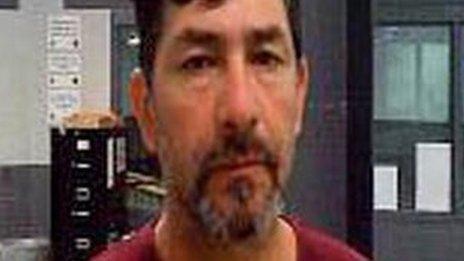
US Customs and Border Patrol agents arrested Rene Murillo-Almansa, external as he was crossing the border into the US near Nogales, Arizona.
When officers ran a background check, they noticed that he had a criminal record that reached back to the 1990s.
Murillo-Almansa was convicted of the sexual assault of a minor in 1994 and served 26 months in jail, followed by a two-year probation.
In February, he was deported, but crossed back into the US illegally. He now faces felony charges for illegal re-entry and will probably be deported again.